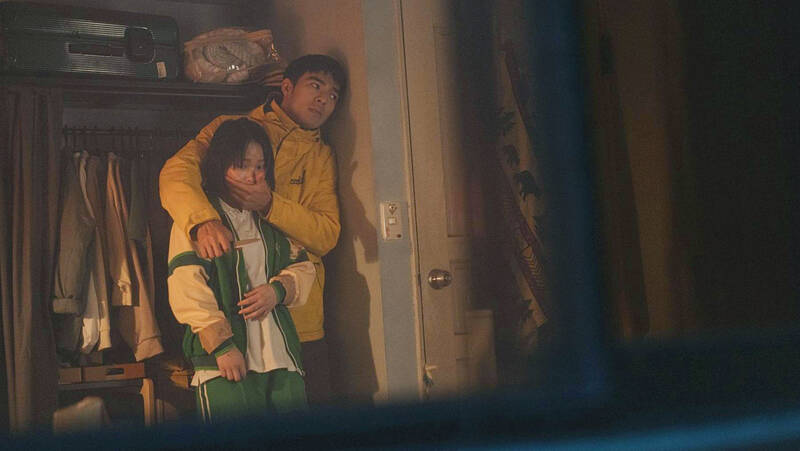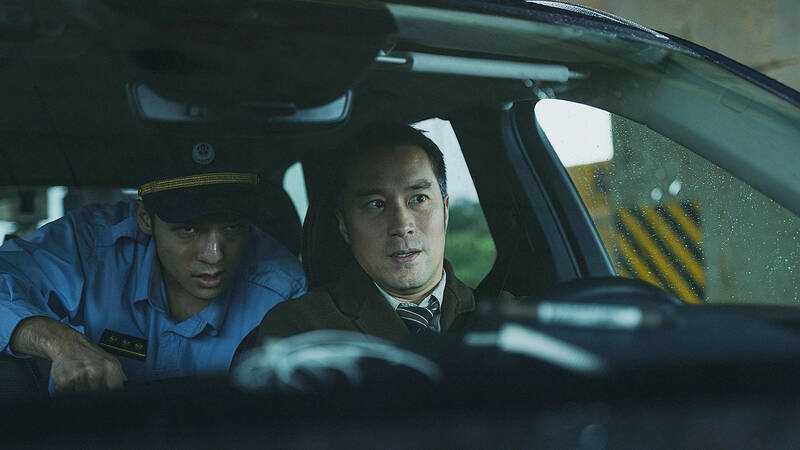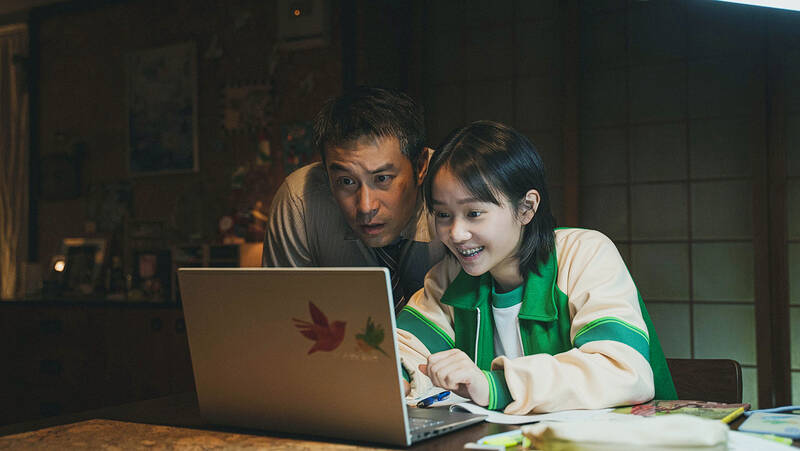This is the type of movie that makes people hate journalists. Not only does Chang Hsiao-chuan (張孝全) effortlessly play the stereotypical dogged, slimy reporter who discards any ethical boundaries to get a story, he habitually manipulates facts to boost online views for his floundering news program.
But the grim truth for the industry, as shown in an exaggerated manner in The Post-Truth World (罪後真相) is that clicks rule the news these days, and viewers should not entirely trust the information being presented. Neither should the journalists themselves.
This biting critique of Taiwan’s increasingly sensationalist media landscape is smartly packaged as a glossy murder-mystery thriller, boosted with celebrity cameos. It’s slick and entertaining enough, but it’s the understated complexity of the main characters that makes the film thought-provoking.

Photos courtesy of Vie Vision Pictures
Despite his flaws and questionable behavior, Chang’s character, Brother Li-min, somehow still manages to come off as a sympathetic hero. He seems to want to do the right thing, especially at the behest of his late wife, who was an award-winning investigative journalist, but also faces immense pressure from his boss (who at the same time makes righteous comments about delivering fair and balanced news) to get views.
Li-min’s precocious teenage daughter Chen-chen, played with nuance by last year’s Golden Horse best newcomer Caitlin Fang (方郁婷), basically takes care of him and is often put in danger due to his recklessness. Her innocent support of her father’s endeavors drives the point of the movie home: she knows that Li-min twists the truth in his videos, but having grown up in the age of social media, perhaps that is the norm. As long as her father’s clips go viral, she’s happy, and Li-min doesn’t seem bothered by this fact.
In his desperate bid to save his program, Li-min inadvertently becomes involved with Chang Cheng-yi (Edward Chen, 陳昊森), a once-promising high school baseball player who spent seven years in prison for murdering his girlfriend. The media paints him as a cold-blooded monster, with YouTubers and other social media creators adding to the fire, leading to his condemnation despite insisting that he is innocent. Chen flaunts his acting chops, deftly portraying the formerly naive, bright-eyed young man now driven by hatred and haunted by his past.

Photo courtesy of Vie Vision Pictures
Li-min believes that Cheng-yi did not commit the murder, and he also believes that overturning the conviction will get him the one million subscribers he needs to avoid cancellation. It’s important to show viewers that the two motives are not mutually exclusive, and not everything about the industry is so black and white.
Li-min soon discovers that the case is more closely tied to people around him than he had imagined, adding to the urgency of his quest and giving it new meaning. What ensues is a pretty standard trope where he goes rogue and helps Cheng-yi, who has escaped from prison and inexplicably manages to elude the police, though he maintains a high profile.
Saying any more would spoil the rest of the film, which is thought provoking with just the right amount of suspense, twists and very few plot holes. It’s not just the media that cannot be trusted, and even what appears to be the “truth” of the case is repeatedly overturned until the very end.

Photo courtesy of Vie Vision Pictures
What happens when Li-min eventually solves the mystery, only to realize that revealing it may do more harm than good? For a movie of this genre, the questions posed are surprisingly complex.

Growing up in a rural, religious community in western Canada, Kyle McCarthy loved hockey, but once he came out at 19, he quit, convinced being openly gay and an active player was untenable. So the 32-year-old says he is “very surprised” by the runaway success of Heated Rivalry, a Canadian-made series about the romance between two closeted gay players in a sport that has historically made gay men feel unwelcome. Ben Baby, the 43-year-old commissioner of the Toronto Gay Hockey Association (TGHA), calls the success of the show — which has catapulted its young lead actors to stardom -- “shocking,” and says

Inside an ordinary-looking townhouse on a narrow road in central Kaohsiung, Tsai A-li (蔡阿李) raised her three children alone for 15 years. As far as the children knew, their father was away working in the US. They were kept in the dark for as long as possible by their mother, for the truth was perhaps too sad and unjust for their young minds to bear. The family home of White Terror victim Ko Chi-hua (柯旗化) is now open to the public. Admission is free and it is just a short walk from the Kaohsiung train station. Walk two blocks south along Jhongshan

The 2018 nine-in-one local elections were a wild ride that no one saw coming. Entering that year, the Chinese Nationalist Party (KMT) was demoralized and in disarray — and fearing an existential crisis. By the end of the year, the party was riding high and swept most of the country in a landslide, including toppling the Democratic Progressive Party (DPP) in their Kaohsiung stronghold. Could something like that happen again on the DPP side in this year’s nine-in-one elections? The short answer is not exactly; the conditions were very specific. However, it does illustrate how swiftly every assumption early in an

Snoop Dogg arrived at Intuit Dome hours before tipoff, long before most fans filled the arena and even before some players. Dressed in a gray suit and black turtleneck, a diamond-encrusted Peacock pendant resting on his chest and purple Chuck Taylor sneakers with gold laces nodding to his lifelong Los Angeles Lakers allegiance, Snoop didn’t rush. He didn’t posture. He waited for his moment to shine as an NBA analyst alongside Reggie Miller and Terry Gannon for Peacock’s recent Golden State Warriors at Los Angeles Clippers broadcast during the second half. With an AP reporter trailing him through the arena for an